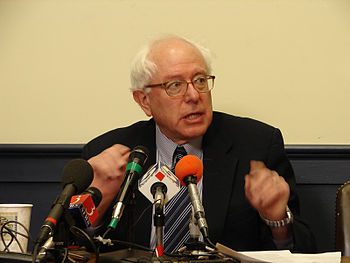
Bernie Sanders says he’s taking the Democratic presidential nomination contest all the way to the party’s national convention in Philadelphia at the end of July. Believe it.
With increasing intensity after each primary or caucus he loses — and for that matter after each primary or caucus he wins — party big-wigs call on him to concede the race and get out of Hillary Clinton’s way. Politico‘s informal April survey of anonymous Democratic “insiders” has nearly 90% wanting Sanders out no later than the DC primary in mid-June and only 10% urging him to hold out to the bitter end.
Why isn’t he listening to the 90%? As a Florida Democrat told Politico, “[t]here is no path, and there is no math.” Actually there are at least four paths.
Path #1: Clinton’s health fails in a very big and very public way. She’s had multiple public fainting spells since 2005, including one resulting in a broken elbow in 2009. In 2012, she suffered a concussion and was hospitalized with cerebral venous thrombosis, a life-threatening blood clot condition. Her campaign health statement acknowledges these problems and throws in hypothyroidism to boot, although characterizing the 67-year-old as enjoying “excellent” health.
Path #2: Clinton is indicted in, or otherwise dragged down over, the “Servergate” affair, in which she appears to have illegally mishandled classified information while Secretary of State.
Path #3: Clinton comes to big legal or political grief over apparent connections between large donations to her family’s foundation on one hand and her actions as Secretary of State on the other. For example, the Kingdom of Saudi Arabia donated $10 million to the Clinton Foundation and Boeing donated $900,000. Later, Secretary Clinton cleared a $29 billion arms deal involving the two parties. You can see how that kind of thing looks. There may be some “there” there.
Path #4: The texts of Clinton’s Wall Street speeches, for which she received millions of dollars in honoraria, are leaked. Clinton’s refusal to release those texts tells us that their release would be politically damaging. Everything comes to light sooner or later. If it’s sooner — that is, before July — we may find out how just how damaging.
Any of these four scenarios might result in Hillary Clinton’s ignominious withdrawal from the presidential race and release of her delegates, followed by the party’s scramble for an alternative nominee. If Bernie Sanders doesn’t quit, he becomes the odds-on favorite for the job.
So he won’t quit. And now you know why.
Thomas L. Knapp (Twitter: @thomaslknapp) is director and senior news analyst at the William Lloyd Garrison Center for Libertarian Advocacy Journalism (thegarrisoncenter.org). He lives and works in north central Florida.
PUBLICATION/CITATION HISTORY
- “Bernie Sanders Won’t Drop Out. Here’s Why.” by Thomas L. Knapp, OpEdNews, 04/23/16
- “Bernie Sanders Won’t Drop Out. Here’s Why.” by Thomas L. Knapp, Ventura County, California Citizens Journal, 04/24/16
- “Bernie Sanders Won’t Drop Out, Here’s Why,” by Thomas L. Knapp, CounterPunch, 04/25/16
- “Bernie Sanders Won’t Drop Out. Here’s Why.” by Thomas L. Knapp, Uintah Basin, Utah Standard, 04/26/16


